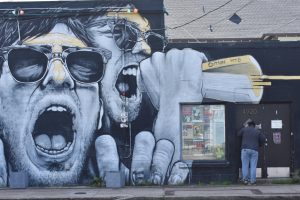Editorial: We need to talk about gun violence
April 7, 2021
We’ve grown accustomed to seeing mass shootings in the news almost constantly. Often, the news coverage of one can’t even wrap up before the next one happens. Just in recent weeks, there have been multiple high-profile mass shootings. In one, eight people were killed at spas and massage parlors in Atlanta, and in the other, ten people were killed at a grocery store in Boulder, Colorado. Many of us wonder if this is what it means for life to “get back to normal.”
This news was horrifying and heartbreaking, but it wasn’t surprising, especially for young people. We’re all too used to this.
Our whole lives, we’ve lived with this fear in the back of our minds—the fear that we might get shot at school, at the airport, at the grocery store, at church. As children, many of us experienced active shooter drills in our classrooms. All of us went to school at some point wondering if we would make it home alive. Some of us even experienced shooting threats at our own schools.
Every time this happens, our leaders in government, especially Republicans, dance around the issue and make excuses for doing nothing. After the Boulder shooting, Louisiana’s own Sen. John Kennedy appeared on Fox News to joke about the killings and make bad-faith excuses.
Inaction implies acceptance. The longer our leaders do nothing, the clearer it becomes that they’re okay with this. We’re not, though.
The Maroon supports universal background checks and an assault weapons ban. When James Madison drafted the Bill of Rights, the founding fathers couldn’t even conceive of an AR-15. It’s time to stop pretending that the Constitution was written to protect your right to own one. Universal background checks are really the key here, though. So many mass shooters have a history of violence before they commit a shooting. By closing the gun show loophole and requiring background checks before any and all gun sales, we can prevent many deaths.
We’re well aware that gun control is perhaps least popular here in the Deep South. But as young people, we have power to change that. You, Loyola students, can talk to your family members and others you know who oppose gun control. Explain to them why young people overwhelmingly feel this way.
This isn’t an oppressive push by Big Government to take everyone’s guns away. It’s a grassroots movement by a generation whose shared experience is defined by a pattern of senseless violence to bring about popular, incremental, common-sense reform.
We recognize, also, that guns are far from the only factor in mass violence. White supremacy, political radicalization, alienation, and countless other factors contribute to these acts of violence. But the most immediate, tangible steps we can take are to restrict dangerous people’s access to guns.
Mental health is a massive, complex problem of its own. We support legislative action to improve mental health services, too, but that won’t help right away. Gun control will.
For people our age and younger, mass shootings have always been a fact of life, but it doesn’t have to be this way. We can bring about change. If we want to stop the cycle of violence, we have to start somewhere.









William Fontaine de La Tour "Bill" Dauterive • Apr 8, 2021 at 7:15 pm
Laughs in .45 acp